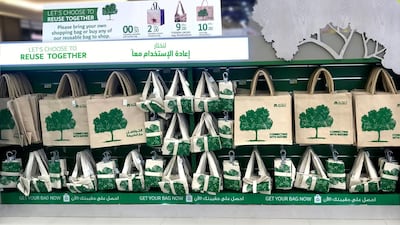Retail giant Carrefour is striking a blow in the UAE's war on waste by serving up free, reusable bags for shoppers on Wednesday.
Customers who bring their own reusable bag to any of the supermarket chain's 31 branches in the UAE will be rewarded with a foldable canvas bag or a juco bag, made from environmentally-friendly fabrics, to use on subsequent shopping trips.
The campaign has been launched with the aim of reducing the reliance on single-use plastic bags across the UAE.
Those using renewable bags will also be able to skip the queues and take advantage of a fast-track counter in store to pay for their goods.
Carrefour, a French brand with thousands of stores in more than 30 countries, is operated in the UAE by Majid Al Futtaim.
“Sustainability is at the heart of what we do at both Carrefour and Majid Al Futtaim, and we are setting ourselves ambitious targets to reduce single-use plastic usage,” said Philippe Peguilhan, country manager at Carrefour UAE at Majid Al Futtaim Retail.
“We aim to inspire customers through our initiatives to contribute to a greener earth while we continue to create great moments for everyone every day.”
When Carrefour ran a similar scheme last year it led to a ten-fold increase in the number of customers using renewable bags.
Customers at the Mall of the Emirates branch will also be able to get their initials or name monogrammed onto any foldable bag they purchase.
Mr Peguilhan said that Carrefour was the first store in the UAE to introduce reusable bags in 2007.
There are two million plastic bags in use each minute across the world, with the average time of use being a mere 12 minutes per bag.
In some cases, it can take up to a thousand years for a bag to decompose.
Plastic pollution is also responsible for the deaths of more than 1.1 million animals and seabirds each year.


